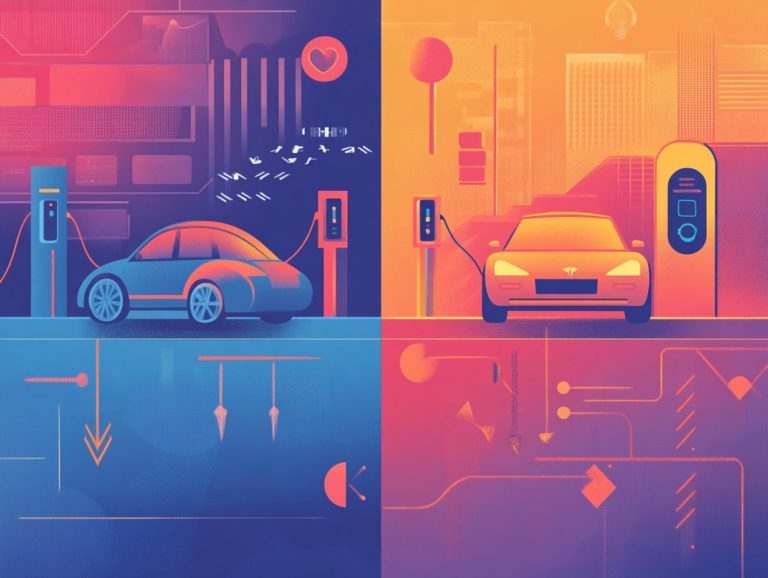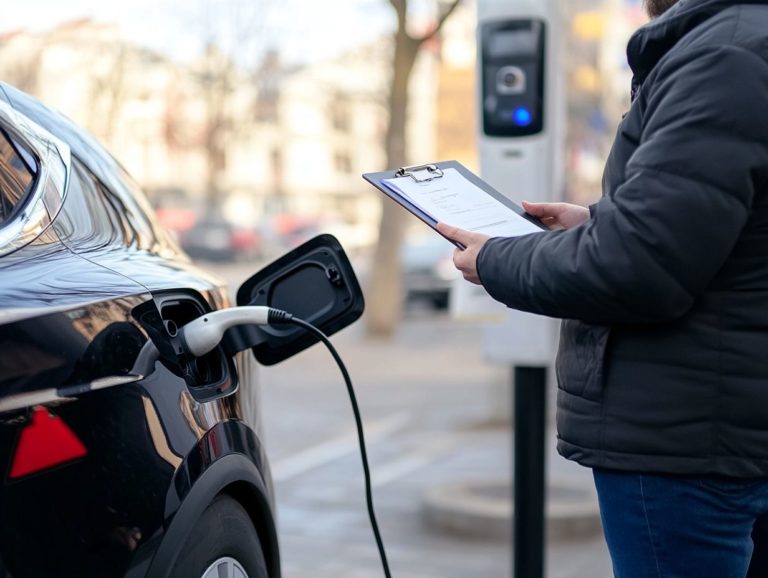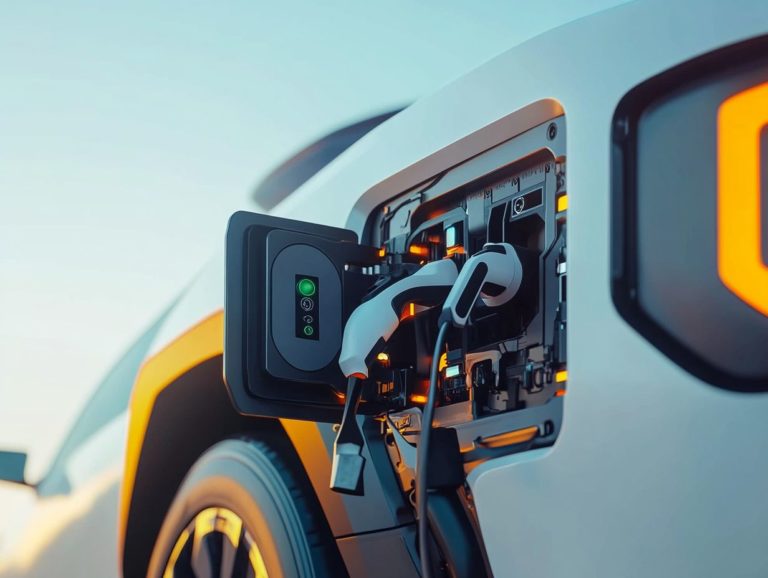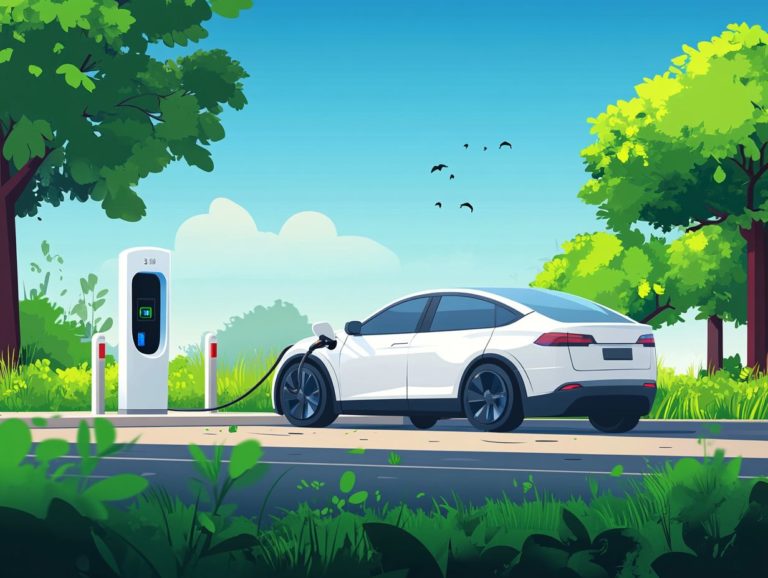what’s the impact of evs on traditional fuel stations?
As Electric Vehicles (EVs) gain momentum, they are transforming the automotive landscape and presenting a significant challenge to traditional fuel stations.
This transition not only diminishes the demand for fossil fuels but also prompts fuel station owners to reevaluate their business strategies.
Find out about the far-reaching effects of EVs on the fuel industry, the hurdles station owners encounter, and the distinct opportunities that emerge from this evolution.
Together, let s explore the exciting future of fuel stations in a world that is becoming increasingly electric.
Contents
- Key Takeaways:
- The Rise of Electric Vehicles (EVs)
- Effects on Traditional Fuel Stations
- Challenges for Fuel Station Owners
- Opportunities for Fuel Stations
- The Future of Fuel Stations in the Age of EVs
- Frequently Asked Questions
- What is the impact of EVs on traditional fuel stations?
- How are traditional fuel stations affected by the rise of EVs?
- Are traditional fuel stations adapting to the changes caused by EVs?
- What will happen to traditional fuel stations in the future with the continued growth of EVs?
- How can the impact of EVs on traditional fuel stations be mitigated?
- What are the potential benefits of EVs on traditional fuel stations?
Key Takeaways:
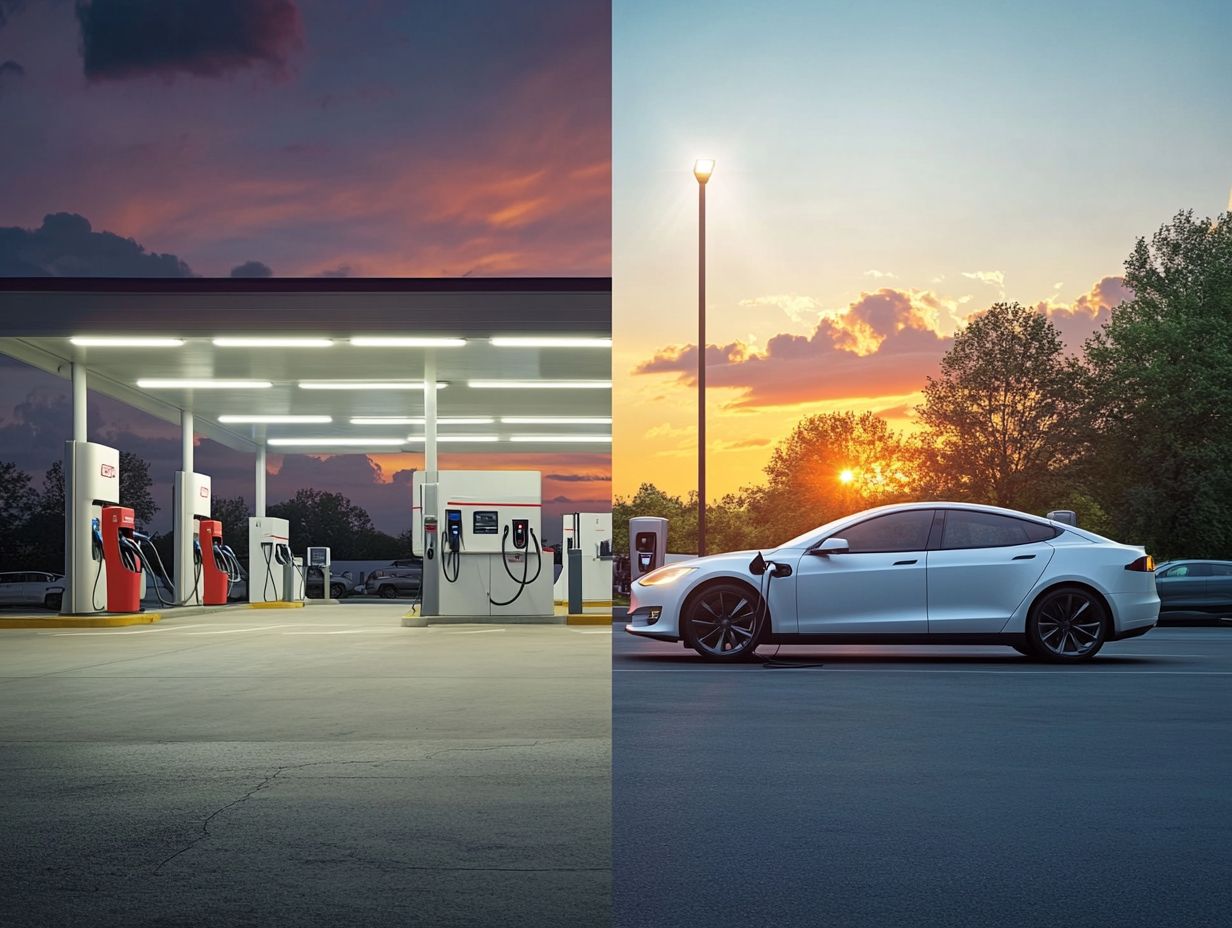
The rise of EVs is leading to a decrease in demand for traditional fuel, posing a challenge for fuel station owners.
Fuel stations have the opportunity to collaborate with EV companies and diversify their services to adapt to the shift in market demand.
Investing in EV charging infrastructure is crucial for fuel stations to remain relevant and thrive in the age of EVs.
The Rise of Electric Vehicles (EVs)
The rise of Electric Vehicles (EVs) in recent years signifies a monumental shift in the transportation landscape, fueled by increasing awareness of environmental issues, advancements in technology, and a burgeoning demand for energy-efficient vehicles.
As consumers prioritize sustainability, governments and automakers are championing electric vehicles as credible alternatives to traditional gasoline-powered cars.
You’ll find an array of options available, from hybrid electric vehicles to fully battery electric models, all gaining traction.
This trend is not merely reshaping consumer preferences; it is also making a significant impact on related sectors, including energy production and distribution.
This sparks important discussions about energy security and emissions reduction.
Overview of EVs and their Popularity
Electric Vehicles (EVs) are swiftly becoming the preferred choice for consumers around the globe, thanks to their environmental benefits and remarkable technological advancements.
The rising popularity of EVs is linked to several pivotal factors that have reshaped the automotive landscape.
One significant development is the ongoing enhancement of charging infrastructure, which has made it increasingly convenient for you to recharge your vehicle.
Your growing awareness of the environmental advantages, particularly the reduction of emissions, has also played a vital role in shifting preferences toward electric options.
With an expanding network of public charging stations, the fear of running out of battery charge before being able to recharge has become a thing of the past.
This allows you to embrace EVs with confidence for both your daily commutes and long-distance journeys.
As these elements align, the future of electric mobility looks exceptionally promising for all consumers.
Effects on Traditional Fuel Stations
The rise of electric vehicles is transforming the landscape of traditional fuel stations, prompting a notable decline in gasoline demand.
This shift compels fuel station owners to reconsider the viability of their business in an electrified transportation environment.
Decrease in Demand for Fuel
The rise in electric vehicle adoption is leading to a marked decline in gasoline demand, prompting fuel stations to adjust to this evolving landscape.
As consumers embrace electric vehicles driven by technological advances and sustainability incentives traditional gasoline consumption is on a downward trajectory.
Reports suggest a consistent annual decline in gasoline sales, with forecasts indicating a potential drop of up to 20% by 2030.
This shift reflects changing consumer preferences and heightens awareness about the environmental consequences of fossil fuels.
It fosters a broader movement towards cleaner energy solutions.
The International Energy Agency (IEA) emphasizes that increased electric vehicle adoption could result in emissions reductions amounting to millions of tons, aligning with global climate targets and paving the way for a cleaner, greener future.
Changes in Business Model
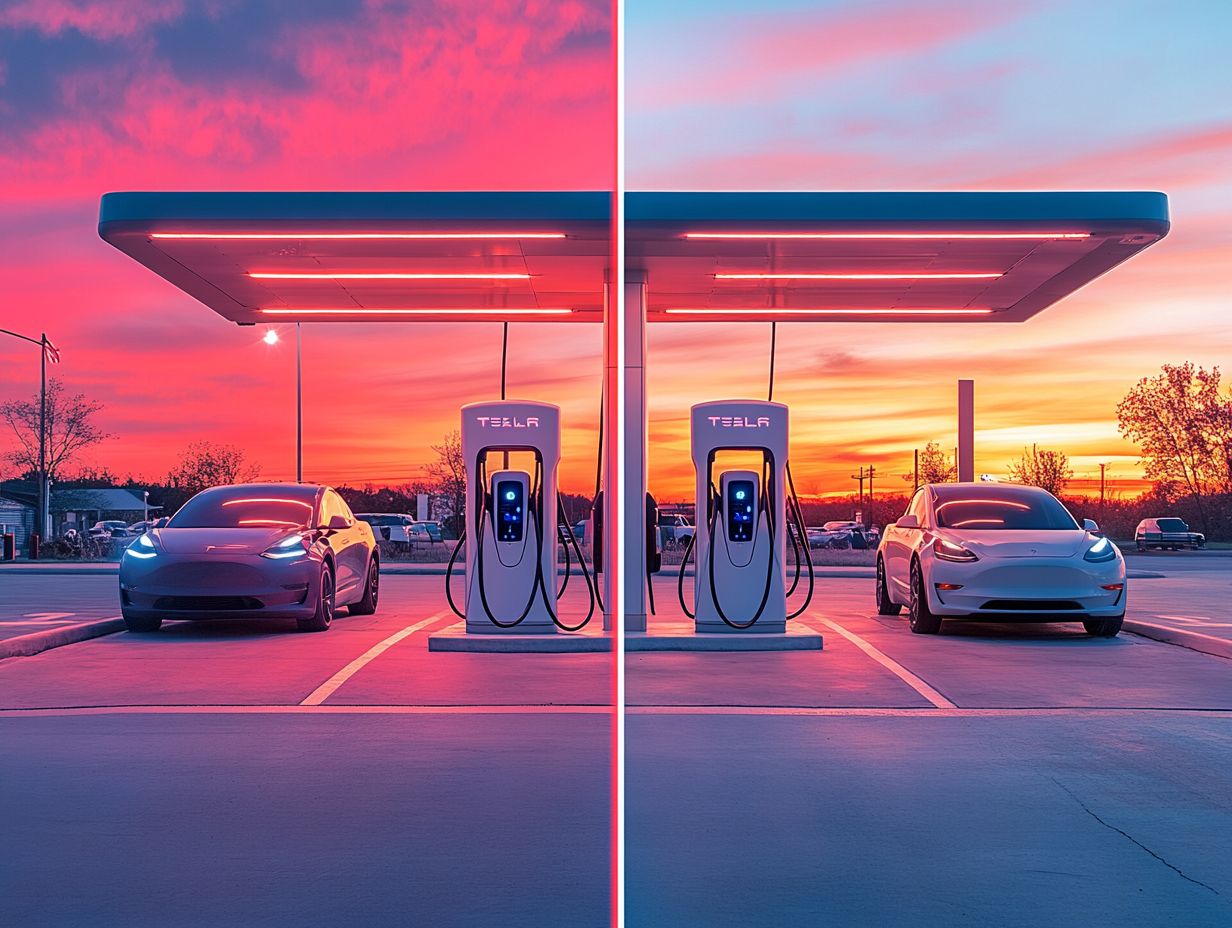
As electric vehicle adoption continues to rise, traditional fuel stations are reassessing their business models to incorporate charging infrastructure, which includes charging stations for electric vehicles, alongside conventional fuel pumps.
This shift positions these stations to meet the demands of environmentally conscious consumers. It also acts as a strategic response to the anticipated decline in fossil fuel reliance.
By integrating charging stations, they diversify their service offerings and enhance their competitiveness in a marketplace that increasingly prioritizes sustainability.
The expansion of charging infrastructure is vital for alleviating range anxiety among EV owners. It ensures they have convenient access to power on their journeys.
Financially, this pivot can bolster the viability of gas stations, transforming potential downturns into lucrative opportunities while attracting a broader customer base.
Challenges for Fuel Station Owners
As a fuel station owner, you face many challenges in an automotive market increasingly leaning toward electric vehicles. You must adapt to changing consumer behavior and invest in a robust charging infrastructure to stay competitive and relevant in this evolving landscape.
Adapting to the Shift in Market Demand
Adapting to the shift in market demand is essential for you as a fuel station owner navigating the challenges brought on by the rise of electric vehicles. To thrive in this evolving landscape, it’s crucial to prioritize market research to uncover insights into changing consumer behavior.
This knowledge will illuminate the trends and preferences that influence fueling choices. With this information, you can determine whether it’s time to pivot your services toward alternative offerings or enhance your current facilities.
It’s crucial to develop a strong strategy for electric vehicle infrastructure. Investing in fast-charging stations not only caters to the growing EV market but also ensures you remain relevant.
By integrating renewable energy sources and cultivating partnerships with EV manufacturers, you can position your business as forward-thinking and adaptable in a competitive environment.
Investing in EV Charging Infrastructure
Investing in EV charging infrastructure is vital for you as a fuel station owner who wants to stay competitive in the ever-evolving automotive landscape. As electric vehicles gain popularity, recognizing the strategic advantage of integrating charging stations into your service offerings is crucial.
This investment positions you as a forward-thinking business and addresses the growing consumer demand for sustainable travel options.
You have various types of charging stations to choose from, including:
- Level 1: Standard household outlet charging.
- Level 2: Faster charging for home and commercial use.
- DC fast chargers: Very quick charging for long trips.
Each option is designed to meet distinct user needs. By enhancing your facilities with these options, you can diversify your services and ultimately unlock new revenue streams, ensuring your long-term viability in a rapidly changing market.
Opportunities for Fuel Stations
Despite the challenges that the rise of electric vehicles presents, you have a wealth of opportunities at your fingertips.
You can seize exciting opportunities by partnering with EV companies and expanding your service offerings to thrive in this evolving landscape.
Collaborating with EV Companies
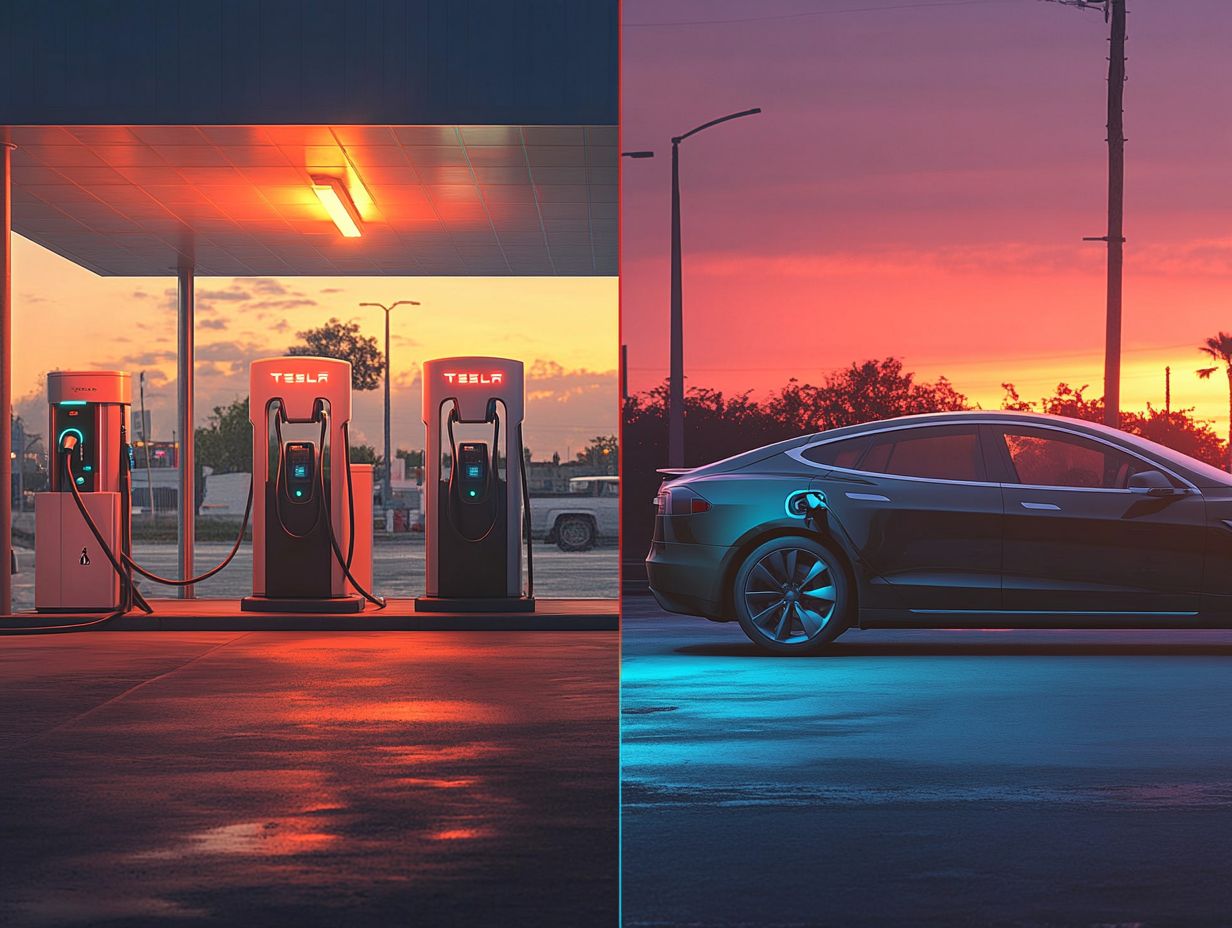
Collaborating with electric vehicle companies offers you a remarkable opportunity to elevate your fuel station offerings and enhance your charging infrastructure.
By harnessing the expertise and technology of EV manufacturers, you can significantly increase the availability of charging stations, ensuring they are strategically placed to cater to the rising demands of electric vehicle owners.
This partnership enriches the customer experience and paves the way for innovative business models, such as subscription-based charging and loyalty programs designed specifically for frequent EV users.
As charging stations rapidly become common, now is the time for your fuel station to attract a new demographic of environmentally conscious consumers, ultimately driving revenue growth and positioning itself as a leader in the sustainable energy transition.
Diversifying Services Offered
Diversifying the services offered at your fuel station can significantly broaden your customer base and bolster profitability, especially as gasoline demand declines.
To navigate this evolving landscape effectively, consider implementing alternative fueling options. Electric vehicle charging stations or hydrogen fueling points cater to the increasing number of eco-conscious consumers.
Exploring retail opportunities such as small convenience stores, cafes, or car wash services elevates the customer experience while creating additional revenue streams.
Enhancing your charging services with fast and reliable options attracts electric vehicle owners. This positions your station as a one-stop solution for all their fueling needs.
The Future of Fuel Stations in the Age of EVs
The future of fuel stations in the era of electric vehicles is on the brink of remarkable transformation. This shift is driven by exciting new market trends and the necessity for innovative EV strategies that resonate with consumer preferences.
Predictions and Projections
Predictions for the future suggest a significant shift toward electric vehicle charging capabilities. Many traditional gas stations will evolve into multifunctional service hubs.
This transformation mirrors a broader trend, as consumer behavior rapidly adapts to the rising popularity of electric vehicles. As a driver, your priorities are changing; sustainability and convenience are becoming paramount.
You want charging options that promise efficiency while elevating your overall experience. In response, fuel stations are actively exploring ways to meet these new preferences.
Expect options like food services, retail shops, and cozy spaces to relax while your vehicle charges. This forward-thinking strategy positions these stations for the rise of EVs and ensures traditional fuel stations remain relevant.
Frequently Asked Questions
What is the impact of EVs on traditional fuel stations?
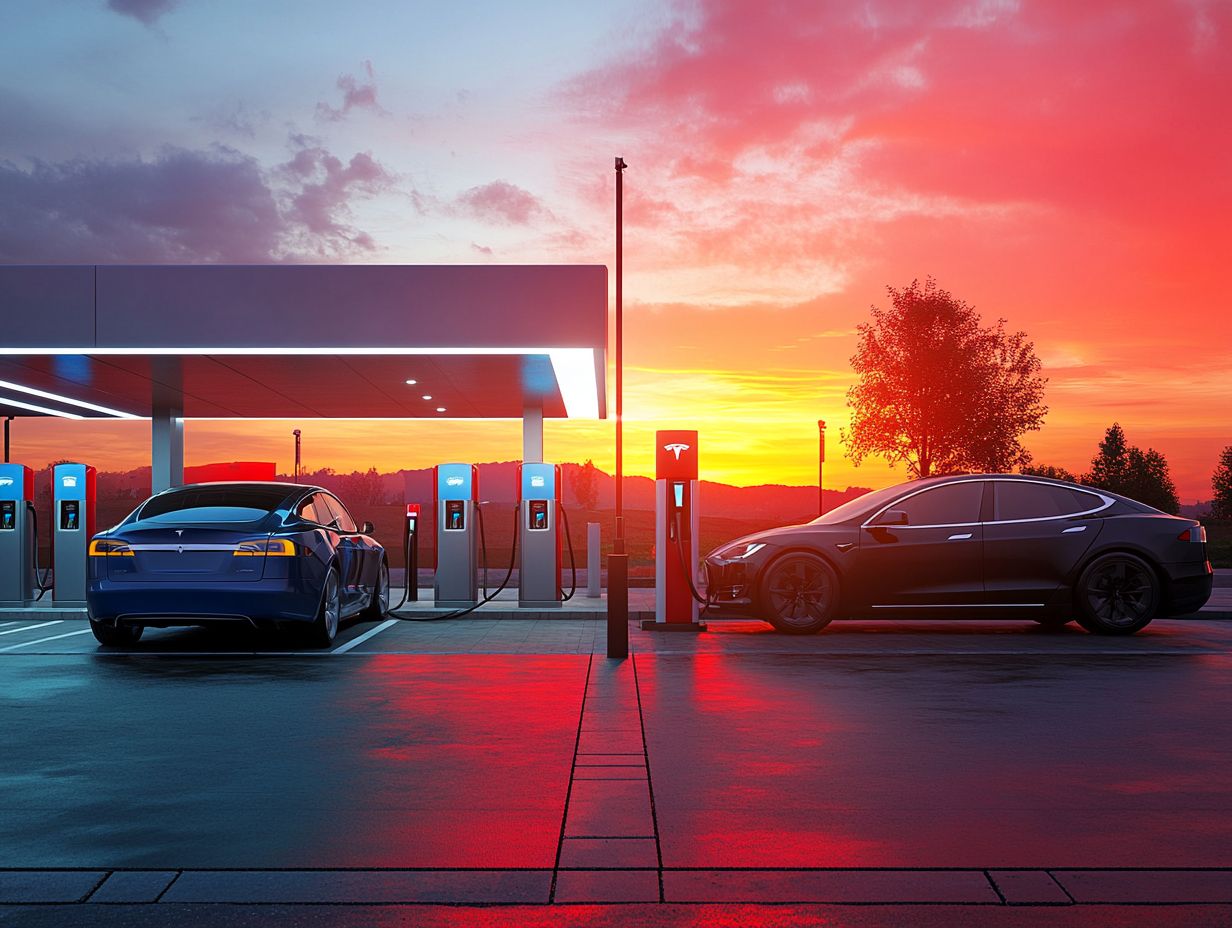
The increasing popularity of electric vehicles is significantly impacting traditional fuel stations. EVs are powered by electricity, making them less reliant on traditional fossil fuels.
How are traditional fuel stations affected by the rise of EVs?
The rise of EVs decreases the demand for traditional fuels, resulting in a decline in business for fuel stations. This can also lead to reduced revenue and profitability for these stations.
Are traditional fuel stations adapting to the changes caused by EVs?
Yes. Many traditional fuel stations are starting to adapt by offering charging stations for EVs and exploring alternative fuels such as hydrogen or biofuels.
What will happen to traditional fuel stations in the future with the continued growth of EVs?
It is predicted that the number of traditional fuel stations will decrease as EVs become more prevalent due to declining demand for traditional fuels and the growing need for EV charging stations.
How can the impact of EVs on traditional fuel stations be mitigated?
To minimize the negative impact, some governments are implementing policies and incentives to support the transition to electric vehicles. This includes subsidies for charging stations and tax breaks for businesses investing in EV infrastructure.
What are the potential benefits of EVs on traditional fuel stations?
Although the rise of EVs may have negative effects, there are potential benefits. For instance, EVs can help reduce air pollution and greenhouse gas emissions, leading to a cleaner and healthier environment. Traditional fuel stations that adapt can benefit from new revenue streams by offering charging services or alternative fuels.

